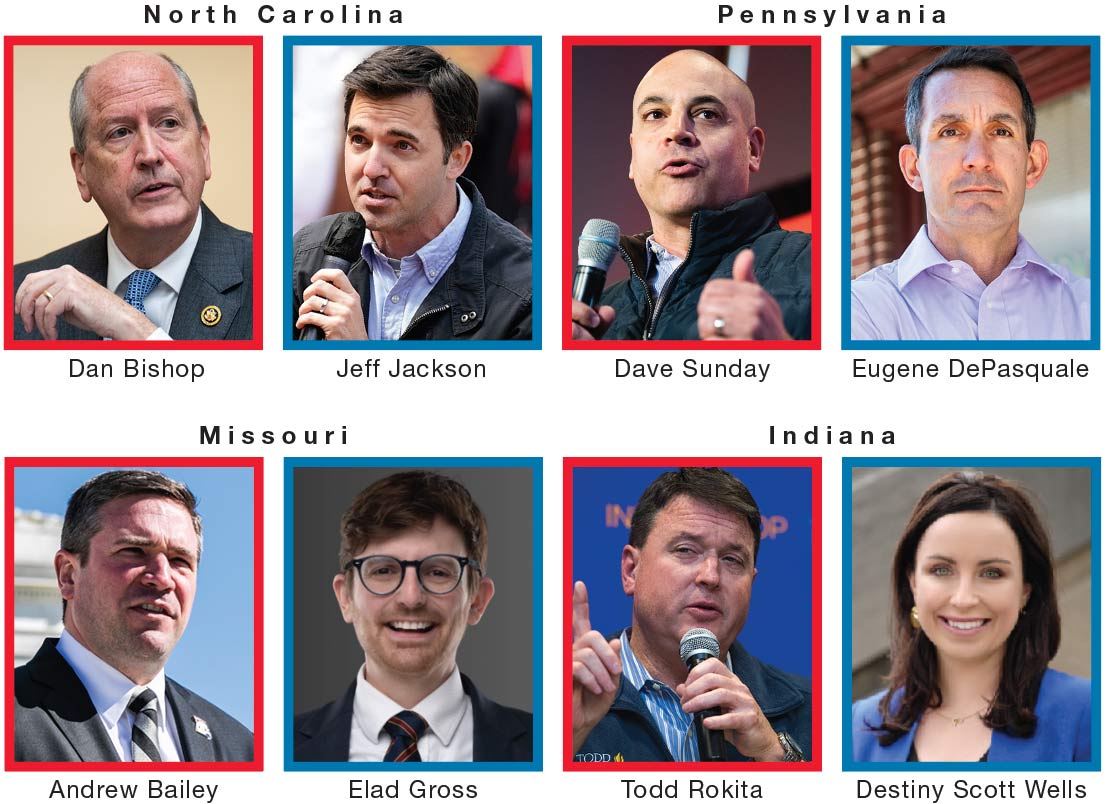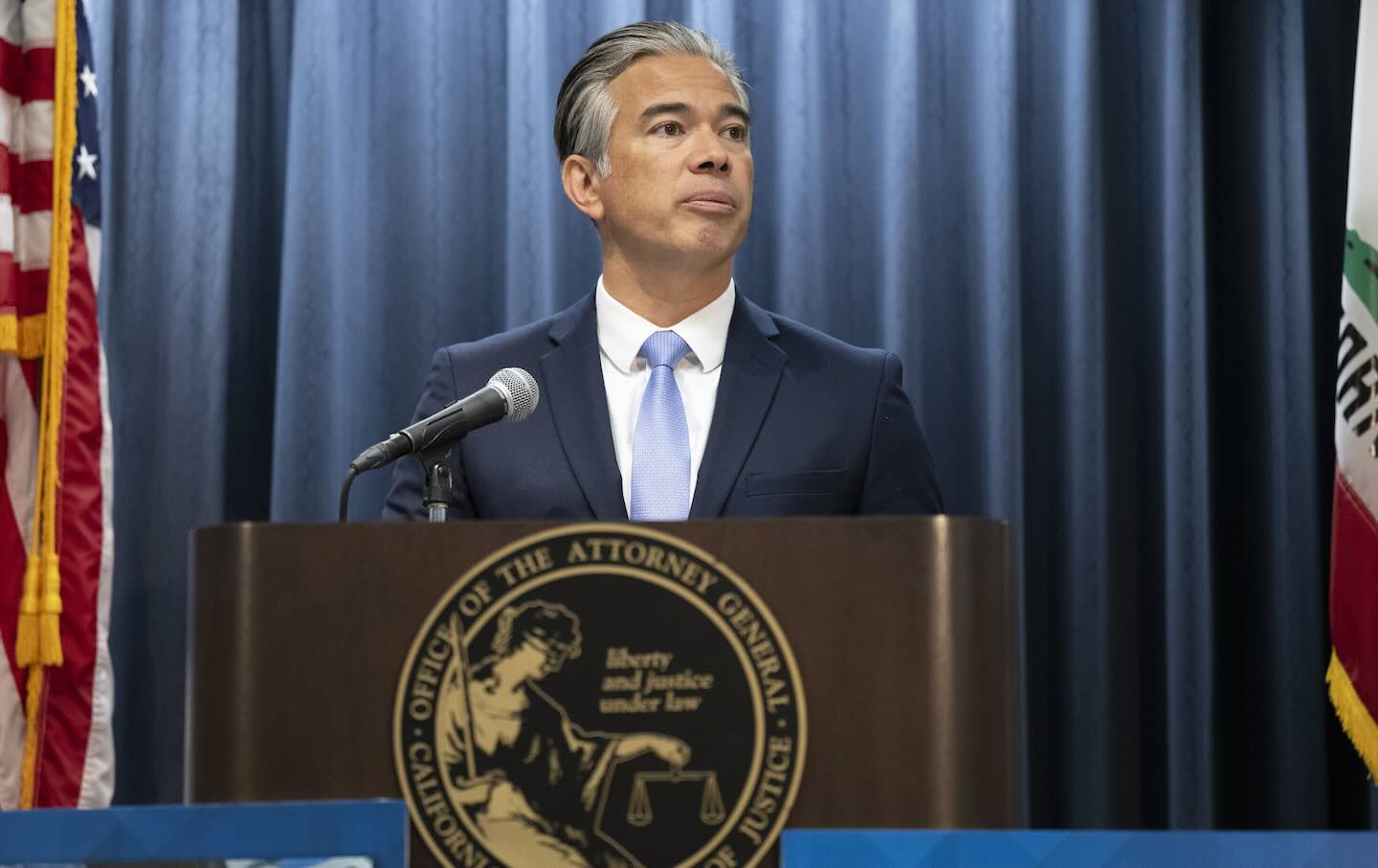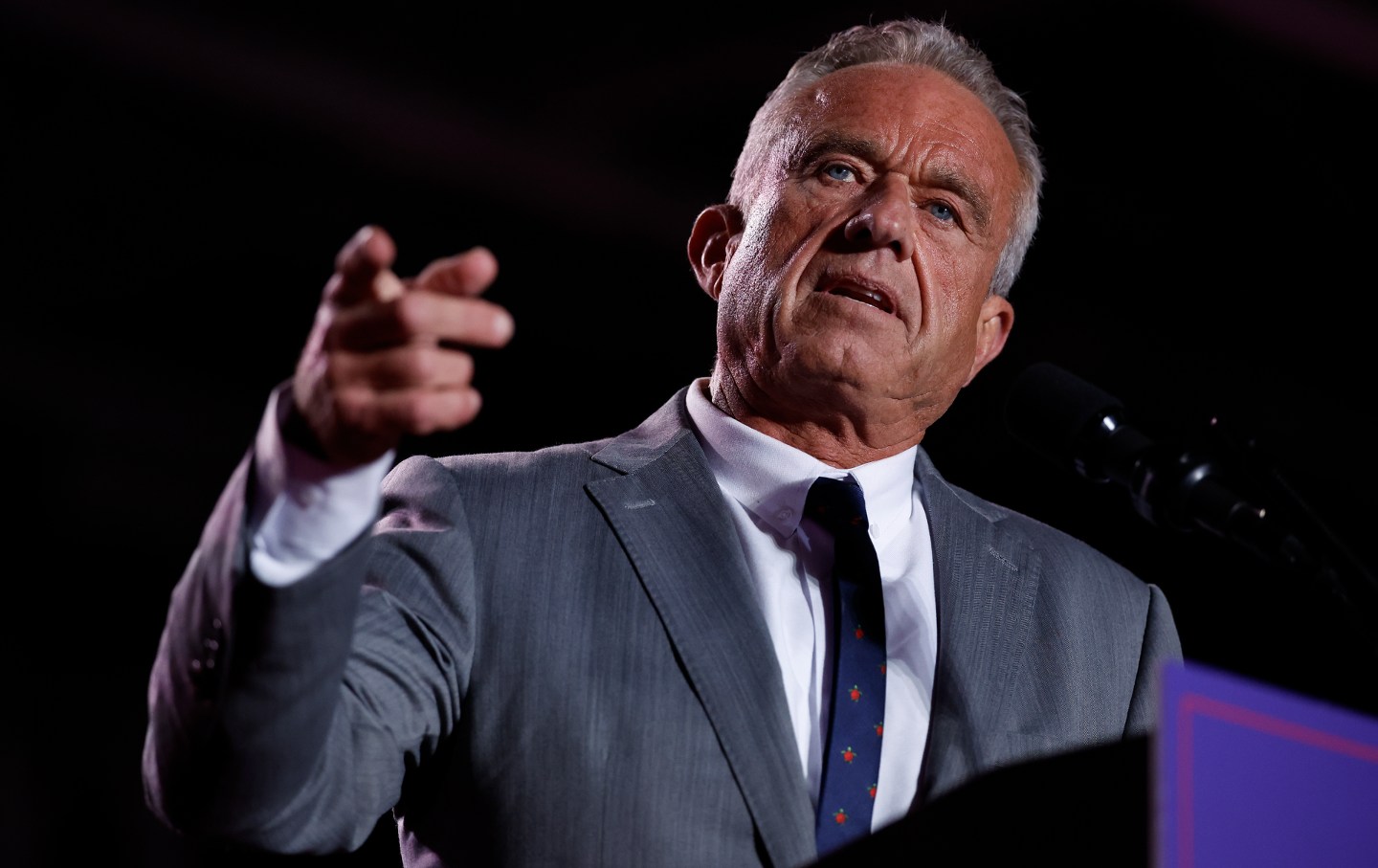Meet the MAGA Zealots Who Are Gunning to Become Their State’s Top Prosecutors
The Republican Attorney Generals Association is working overtime to install authoritarian AGs across the country.

Authoritarian regimes cannot work without functionaries and bureaucrats who enforce the strongman’s will at the local level. A despot, even one who is operating above the law and using all the tools of fear and violence at his disposal, cannot easily reach into people’s everyday lives.
As detailed in the Project 2025 organizing document, Republicans have big plans for a fascist takeover of the national government should Donald Trump be reinstalled as president.
(Trump has tried to distance himself from the project, but don’t be fooled.) Their plans involve placing Trump loyalists at every level of government, stripping executive agencies of their independence, and using the levers of power to take rights away from women, the LGBTQ community, and pretty much anybody who dares to oppose them.
Project 2025 is a plan for the national level, but what about state and local concerns? Obviously, conservatives plan on winning—and holding—many gubernatorial seats and statehouses, imposing their antebellum vision through the power of state government, just as white folks were able to do during the Jim Crow era. But there is another important piece in the totalitarian apparatus: state attorneys general. By controlling the office of a state’s top prosecutor, Republicans can break into people’s homes and bedrooms and turn their culture-war obsessions into criminal penalties and prison time. Should Trump’s dystopian reelection come to pass, it likely won’t be SEAL Team 6 standing with its jackboots on the necks of civil liberties and pluralistic tolerance. It will be a state trooper, acting under the direction of an elected state attorney general, who comes to your wedding to break up your same-sex marriage, deport your friends, or force your daughter to bring a pregnancy to term against her will.
To help promote this dreadful work, Republicans have an organization in place that both amplifies the efforts of existing authoritarian AGs and recruits and backs future ones. It’s called the Republican Attorneys General Association, or RAGA. Founded in 1999 as part of the Republican State Leadership Committee (a group devoted to getting Republicans elected to statewide office), RAGA split off as its own entity in 2014. Since then, a villainous row of wealthy Republican donors have poured millions upon millions of dollars into the group, successfully installing their candidates in the top prosecutor spots and making sure that, once in office, those Republican AGs do what their donors paid for.
There are 27 Republican state attorneys general—and all of them share a broadly extremist agenda, regardless of the particularities of their state. They’re all anti-immigrant, and they’re willing to use every shred of their power to harass, detain, and deport people who are out of status. They’re in favor of forced birth. They’re anti-trans, anti-labor, and anti-environment, and they support smash-and-grab capitalism. Only five are women. Almost all of them are white.
RAGA is incredibly well funded. The organization rakes in dollars from Koch Industries (the multinational, earth-destroying conglomerate operated by Charles Koch); the US Chamber of Commerce Institute for Legal Reform (a group dedicated to protecting big business by preventing class-action lawsuits and limiting legal liability for wrongdoing); and Altria Client Services and Reynolds American (both lobbying arms of the tobacco industry). By far the biggest RAGA funders, though, come from groups aligned with the conservative legal archfiend Leonard Leo.
According to Open Secrets, the Leo-aligned Judicial Crisis Network gave $4 million to RAGA in the 2020 election cycle, $6.5 million in 2022, and $1 million (so far) in 2024. And that’s just the money we can track via public filings; Leo is also widely believed to control the purse strings of the dark-money behemoth the Concord Fund. Reports indicate it has funneled at least $9.5 million to RAGA since 2020.
We have an idea of what all these donors are getting for their money, because RAGA produces a “price list” that details its pay-to-play scheme. According to documents from 2018 that were obtained by True North Research, for an annual contribution of just $125,000, donors get to attend the attorneys general annual meeting as well as “retreats” with senior staff of the various officeholders. For an annual contribution of $250,000 or more, donors are instructed to call in to find out what else is on the menu, as if they’re checking on the soup of the day. Who can say for sure what Leo gets for the millions and millions of dollars he directs their way, but my opening guess would be anything he damn well wants.
I think the RAGA pay-to-play scheme can be distinguished from those of other seedy political associations by the fact that the RAGA crew are prosecutors. They’re part of law enforcement. When RAGA officials sell themselves, or appear to sell themselves, what they’re giving away is the fair and equal application of the rule of law. Individuals and corporations that give money to RAGA are potentially buying themselves out of legal scrutiny, or criminal liability, for their business practices. Paying off RAGA is not unlike a Mafia family paying off a detective to look the other way on an unsolved murder, or a drug dealer contributing enough money to the Patrolmen’s Benevolent Association that any cop who pulls him over knows not to write him up for drunk driving.
Last year, ProPublica reported on shady dealings between RAGA officials and Johnson & Johnson. After RAGA supported the January 6 attempted coup, many of its funders fled. So did Johnson & Johnson—at first. But the company, which was facing costly litigation at the state level, soon agreed to a meeting with RAGA bigwigs, and the money began flowing again. A few months later, RAGA attorneys general negotiated two settlement deals with Johnson & Johnson. There’s a reason that corporations like Amazon, Walmart, UPS, and Home Depot, which are often entangled in state litigation, contribute to RAGA.

While cozy, corporate-friendly schemes are a big part of the RAGA docket, its most significant work is ideological. RAGA attorneys use their power to push the Republican agenda through the court system by filing lawsuits and complaints against any law or rule they don’t like.
After the 2020 election, the Texas AG and indicted felon Ken Paxton brought a motion to the Supreme Court to invalidate the results of the election in four states that Joe Biden clearly won; 17 RAGA members joined the motion. But the group didn’t stop there. In addition to its legal maneuvers, RAGA engaged in extralegal activities to overturn the election: Its 501(c)4 dark-money wing, the Rule of Law Defense Fund, recorded a robocall urging people to join the protests on January 6 and “stop the steal.”
While RAGA wasn’t able to overthrow the government—with the pen (in courts) or with the sword (at the Capitol)—the example reveals its basic playbook for working the legal system.
Step one: An attorney general files a test case—a lawsuit that the AG knows violates federal law and, just as often, basic logic. Step two: Other RAGA AGs join the fight. Step three: The lawsuit is either rejected by the lower court or, if a Trump judge is presiding, accepted—but in either case, the ruling is almost always appealed by the losing side. Step four: RAGA’s friends on the Supreme Court take the opportunity to intervene and, in most cases, change the federal law to align with Republican political or cultural priorities.
RAGA AGs use this playbook again and again, although their pet issues differ by state. Paxton, for instance, has used test cases to inject as much cruelty as possible into the nation’s immigration policies. Idaho Attorney General Raul Labrador used a test case to try to prevent sick women from receiving emergency medical care should that care include an abortion. Before he was elected as Louisiana’s governor, Jeff Landry led the charge to get the Supreme Court to eviscerate the Clean Water Act.
The call-and-response between RAGA AGs and their allies on the Supreme Court is an essential way that Republicans are able to bypass Congress and enact policies that extend far beyond their states and take away the rights of people living in New York or California.
And RAGA’s biggest funder, Leonard Leo, wants more. Leo has called on RAGA to “flood the zone with cases that challenge misuse of the Constitution by the administrative state and by Congress.” That threat can be made a reality thanks to Leo’s other great quest—to remake the Supreme Court—which he more or less achieved four years ago and which resulted this summer in the conservative justices’ overruling judicial deference to regulatory agencies. The court’s ruling throws into question thousands and thousands of regulations, and RAGA AGs will likely try to deregulate entire industries, one lawsuit at a time.
Still, given the state of reproductive rights in a post–Roe v. Wade world, the most essential function served by RAGA officials in the coming months and years will be as the enforcers of the Republicans’ anti-abortion, anti-LGBTQ, Christofascist agenda. Most RAGA AGs have sued the Biden administration over its mandates to provide gender-affirming care. And RAGA attorneys are leading the charge to criminalize abortions. When the first person is arrested for going out of state to have an abortion, I promise you it will happen at the direction of a RAGA AG. Republicans won’t need to pass a national abortion ban if RAGA attorneys can sue to prevent women and pregnant people from leaving forced-birth states—and arrest doctors and activists from other states who try to help them.
It is worth noting that this is the plan regardless of who wins the presidential election. If Trump wins, RAGA will likely feel emboldened; if Harris wins, it will be determined to try to stop her administration by any means necessary. As long as a conservative supermajority controls the Supreme Court, RAGA attorneys will always be one lawsuit away from changing the nation’s laws.
That’s why focusing on these state elections is vital. In a presidential year, almost all of the electoral oxygen gets sucked to the top of the ticket, for obvious reasons. But people in states with attorney general elections should be motivated to go to the polls and stop RAGA from gaining even more control over the legal apparatus.
There are 10 races for state attorney general this November. Because of the polarization of our politics, eight of those races are noncompetitive, with five almost certain to go to the Republican candidate and three to the Democratic candidate; only two remain truly up for grabs. I’ll focus on those two competitive races, which are in North Carolina and Pennsylvania, but you should also hear about the races in Missouri and Indiana, where the Republican is likely to win but could lose if enough fair-minded voters don’t reflexively vote for whoever has an “R” next to their name on the ballot.

NORTH CAROLINA
jeff jackson (d) vs. dan bishop (r)
No race highlights the importance of state attorneys general more than the contest in North Carolina. That’s because two of the state’s US representatives, Democrat Jeff Jackson and Republican Dan Bishop, decided to give up their seats in Congress to vie for the role of their state’s top prosecutor. In tossing their seats aside, these two politicians are telling us that they’ll have more power and influence—or, at least, better career prospects—by holding a state-level job than they’d have as members of the federal government.
They’re not wrong. A congressperson is just one among 435—someone to be herded alongside the other cats by a strong party leader—who can occasionally propose but rarely enact their preferred policy agenda. An attorney general, by contrast, is an executive who can make policy through lawsuits and prosecutions. And because AGs hold statewide office, the job is often a springboard to other statewide positions, such as governor or US senator. Indeed, there are many governors, including North Carolina’s Roy Cooper, who previously served as the attorney general of their state.
Thanks to their previous turns in elected office, we know that the contrast between these two AG candidates could not be more stark. Before he was elected to Congress, Bishop was a county commissioner who supported North Carolina’s infamous House Bill 2—the country’s first “bathroom bill.” That law, passed in 2016 (and repealed in 2020), dictated where people were allowed to pee, forcing them to use bathrooms according to the sex assigned to them at birth, while also allowing discrimination in public accommodations. One can reasonably expect Bishop to use the full powers of the state AG’s office to harass transgender kids at every available opportunity.
Since he joined Congress in 2019, Bishop has been a member of the far-right “Freedom Caucus” and has voted against every abortion access bill that has been proposed in the House. He has also opposed immigration reform and voted against the Dream Act, which would provide a path to citizenship for children brought to this country by parents who were out of status. Bishop voted in favor of impeaching Secretary of Homeland Security Alexander Mayorkas but voted against impeaching former president Donald Trump.
Anti-immigrant, anti-abortion, and anti-trans, Dan Bishop is the essential distillation of a RAGA candidate.
Jackson, while not the most progressive Democrat, has nonetheless left a different legislative trail while in Congress, voting “no,” for instance, on a restrictive voter registration bill as well as on the Mayorkas impeachment. He is also a defender of reproductive rights, which is critically important in North Carolina. In 2023, the Legislature passed a 12-week abortion ban; while it was ultimately vetoed by Roy Cooper, the Democratic governor, the fact that Republicans enjoy a five-to-two majority on the state Supreme Court means that an attorney general like Bishop, working in tandem with the court’s conservative supermajority, could threaten reproductive rights and women’s health even despite a governor’s veto. Indeed, Jackson has warned that Bishop’s election “could invite certain kinds of lawsuits from him on abortion medication, or the provision of abortion, and they could run all kinds of offense on reproductive freedom from that perch.”
In addition to defending reproductive rights, Jackson has taken strong stances against sexual assault. He was a proponent of a critical 2019 revision to a North Carolina law that closed a “loophole” that prevented women from revoking consent during sexual relations. Jackson has also been a defender of LGBTQ rights and has come out in favor of regulating artificial intelligence.
The contest between Jackson and Bishop shows why state AG races are so important. The election could be the difference between an abortion ban and reproductive freedom, regardless of whom voters send to the Legislature or the governor’s mansion. Nearly every post-Dobbs state election tells me that if voters truly understand what’s at stake, all the RAGA money in the world won’t be enough to win Bishop the job.

PENNSYLVANIA
eugene depasquale (d) vs. dave sunday (r)
Unlike North Carolina’s Bishop, the RAGA-backed attorney general candidate in Pennsylvania is trying to stay away from culture-war issues. Dave Sunday, the current district attorney for York County, is running as a standard-issue carceral prosecutor. He wants to put people in jail and, toward that end, argues that putting people in jail is the best way to stop crime.
Sunday has said that he doesn’t think the state Constitution protects the right to reproductive choice, but he has also said, “I will follow the law, whatever that law is, as determined by the Legislature.” Given the state of conservative politics, that’s about the best you can hope for from a Republican candidate for any office. If his statement were true, I’d say “Fair enough” and move on.
The problem is, it may not be true. During the Covid-19 pandemic, when the law required Sunday to enforce then-Governor Tom Wolf’s mandates and restrictions, he didn’t follow it. Instead, during the earliest, harrowing months of the pandemic, he directed local law enforcement not to issue citations to businesses that violated Wolf’s closure orders. He later doubled down, refusing to enforce Wolfe’s order mandating masks in schools.
Maybe I have trust issues, but when I see a guy so hooked into the conservative matrix that he won’t even enforce a Covid mandate, I struggle to believe that he will let the Legislature decide whether pregnant people should be afforded human rights. Your mileage may vary.
The Pennsylvania AG seat is open this cycle because the previous state attorney general, Democrat Josh Shapiro, vacated it when he successfully ran for governor of the commonwealth in 2022. His victory is yet another indication that winning an attorney general election can be a springboard to higher office.
The Democratic nominee this year is Eugene DePasquale, who has been serving as Pennsylvania’s auditor general. That’s essentially the state’s top investigator, which is a credential for AG, but DePasquale doesn’t have the courtroom and trial experience that Sunday has. He is campaigning on prosecuting individuals who commit hate crimes, defending abortion rights, and opposing voter suppression tactics.
Still, DePasquale’s light prosecutorial record and centrist profile aren’t the main issue in this race, because Sunday and the Republicans aren’t really running against DePasquale. They’re running against Philadelphia District Attorney Larry Krasner, who has effectively defined what a “progressive prosecutor” looks like and has used his prosecutorial discretion to great effect. Krasner is virtually untouchable in Philly, but the “more like Alabama” parts of Pennsylvania have been fed a constant stream of lies and misinformation about his effectiveness. In 2019, the Legislature passed a law allowing the state AG to prosecute certain firearms offenses in Philadelphia—and Philadelphia alone—if Krasner declined to do so.
Should Sunday win, he will most likely use every shred of his authority to frustrate Krasner. That’s what this race is really about.
This, too, is part of the RAGA strategy. Republicans know that even in red and purple states, there are urban centers that the long arm of their culture wars cannot reach. So that’s where state attorneys general come in: They are well positioned to wrest “home rule” away from local DAs elected by Black and brown majorities.
If there are voters in Philadelphia who think they won’t be affected by the state AG race because they have a great top prosecutor at home, I urge them to think again.
MISSOURI
elad gross (d) vs. andrew bailey (r)
I’d like to be able to tell you that the civil rights attorney and former Missouri assistant attorney general Elad Gross has a real shot at taking down the Republican candidate for state AG. Gross seems like a nice man with a sweet sense of humor (his campaign website features a picture of the one time he almost made a tackle in football—before failing three times to make his college team). On the issues, he offers a standard spread of center-left positions, from protecting reproductive rights to stopping public corruption. And Gross is against Missouri’s disgusting puppy mill industry.
The Humane Society rates Missouri as the worst state in the nation in terms of puppy mills. Of the 100 “most problematic puppy breeders” the society tracks, the Show-Me State is home to 23 of them. Gross has an extensive plan to deal with this, including suing inhumane breeders and making it harder for them to advertise and sell. If you can’t already tell, this is an issue I care a lot about, and I would love to see Missouri elect an AG committed to stopping these people.
But… Missourians probably won’t. Missouri is not a bellwether state; it’s a red state with a vocal minority of liberals in St. Louis and Kansas City. The Republican voters of Missouri will functionally kill puppies if that’s what it takes to install the next conservative hopeful who will crush reproductive rights.
This probably helps explain why so much of the attention this summer was focused on the Republican primary for AG, which was held on August 6. Missouri’s previous attorney general was Eric Schmitt, who now serves as the state’s junior US senator. Missouri’s senior senator, insurrectionist fist-pumper Josh Hawley, was the attorney general before him. Missouri’s AG office is a fast track to national prominence for the worst kinds of conservatives.
The GOP primary pitted Missouri’s perfectly rabid current RAGA attorney general, Andrew Bailey, who was appointed by Republican Governor Mike Parson after Schmitt left for the Senate, against Will Scharf, one of Donald Trump’s personal attorneys. Scharf was on the team that successfully argued before the Supreme Court that presidents should be allowed to commit crimes.
RAGA did not officially endorse either candidate in the primary, but Leonard Leo’s mini-army of aligned groups poured money into Scharf’s campaign. Billionaire Republican donor Paul Singer (last seen offering Supreme Court Justice Sam Alito free fishing trips) also put $1.4 million into the campaign.
The argument against Bailey was simply that he wasn’t MAGA enough. Bailey has toed the RAGA line since his appointment in 2023, but Scharf is part of the Leo brain trust, a person who can be counted on to bring whatever test case helps the MAGA movement the most. Scharf’s campaign essentially argued that Bailey didn’t do enough to help Trump overturn the results of the 2020 election.
In the end, Leo’s attempt to install his loyal subject didn’t work: Bailey smashed Scharf in the primary. While his positions are plenty terrible for the women of Missouri, defeating a Leo ally is nonetheless a victory—and a reminder that these state elections don’t always come down to dark money and clandestine influencers. They come down to voters paying attention.
I don’t know if Missouri voters are paying enough attention to elect Gross, a guy who favors the humane treatment of puppies—and women in dire need of medical services—over Bailey, a guy who is suing Planned Parenthood for allegedly helping minors flee Missouri to obtain reproductive care. But I won’t lose hope until the ballots are counted. Some people in Missouri might want an attorney general who works for them, instead of for RAGA.
Popular
“swipe left below to view more authors”Swipe →INDIANA
destiny scott wells (d) vs. todd rokita (r)
The race for attorney general in Indiana is not close: The incumbent RAGA Republican, Todd Rokita, is likely to defeat his Democratic challenger, Destiny Scott Wells. But in a just world, the race would, at the very least, be close. The fact that it’s not is an indictment of the Republican voters of Indiana and their cult-like devotion to the MAGA cause. Rokita is such a problem that Indiana almost changed its laws to make sure that a person like him cannot run for office in the future. Yet here he is.
Rokita is another former member of Congress who became state attorney general. Since assuming office in 2021, he has hit all the RAGA agenda points. He has been zealously anti-immigrant, literally suing a city for passing a local ordinance that declared the place “welcoming” to immigrants. He created a website to make it easier for students to snitch on “woke” teachers. He’s been hostile to voting rights but friendly to corruption (testifying before Congress, he threatened to sue the government should it pass the “For the People” anti-corruption bill). He loves taking money from the pharmaceutical industry.
But none of this is what got Rokita into trouble. In 2022, he took to the airwaves to blast Dr. Caitlin Bernard. Bernard is the Indiana obstetrician who performed an abortion on a 10-year-old rape victim who had to flee Ohio to receive the procedure after the Supreme Court overturned Roe v. Wade. The medical care Bernard provided was legal in Indiana, but Rokita went on Fox News to announce that his office was launching an investigation into her. During his appearance, he called Bernard an “abortion activist acting as a doctor—with a history of failing to report.”
Rokita was reprimanded by the state Supreme Court for violating Indiana’s rules of professional conduct; he later entered into a settlement with the state’s disciplinary commission.
Earlier this year, the Indiana Legislature attempted to pass a bill preventing people from running for attorney general if they had been sanctioned by the state Supreme Court. It wouldn’t have applied to Rokita, since he was reprimanded, not sanctioned, but one gets what they were going for here. Indeed, in March, the Legislature removed the provision, with one Republican calling it “inappropriate in an election year.”
It would be great if all of this mattered to Republican voters, but Rokita wasn’t even challenged in the primary.
Destiny Scott Wells is a capable candidate. She enlisted in the Army National Guard when she was 19 and remains in the Army Reserve. Her campaign is focused on medical privacy—a key issue given the Republican push to revoke contraception rights and scour the medical records of women who deign to travel out of state. She should be a viable alternative to the guy who wants to harass doctors for providing medical care to 10-year-old rape victims. But this is Indiana, so I think we know how this will go.

In the remaining six races where the attorney general slot is in contention, RAGA candidates will likely run the table in Montana, Utah, and West Virginia, while Democrats look poised to win in Oregon, Vermont, and Washington. Once in power, those RAGA AGs will wreak havoc on abortion rights throughout the country. In the other states where they are already installed, they will continue to do the bidding of wealthy Republicans like Leo and, increasingly, Elon Musk, who appears to have captured Texas Attorney General Ken Paxton and persuaded him to sue media organizations on Musk’s behalf.
Still, RAGA’s greatest asset has always been public ignorance of its significance. These elected officials wield more power than any individual congressperson and, with the help of lawsuits designed expressly for the current US Supreme Court, can have more national influence than any governor. Yet most people can’t name them—or the candidates who are running to stop them.
In a presidential election year, most people’s motivation for going to the polls is to vote for the top of the ticket. Some go on to vote for the whole roster of open positions, but plenty give up after filling in the bubble for president. Others, meanwhile, never make it to the polls at all, either because they’re turned off by “politics” and feel that not voting is a protest worth making, or because they feel that their state’s Electoral College votes have already been decided.
If you know any of these people, try to talk to them about their state and local races. Try to talk to them about their state attorney general. Try to talk to them about the large swaths of power they are ceding to these people by not showing up. RAGA attorneys can be beaten, even in states that will ultimately go to Donald Trump. The key to winning these races is for people to understand that they’re important.
We cannot back down
We now confront a second Trump presidency.
There’s not a moment to lose. We must harness our fears, our grief, and yes, our anger, to resist the dangerous policies Donald Trump will unleash on our country. We rededicate ourselves to our role as journalists and writers of principle and conscience.
Today, we also steel ourselves for the fight ahead. It will demand a fearless spirit, an informed mind, wise analysis, and humane resistance. We face the enactment of Project 2025, a far-right supreme court, political authoritarianism, increasing inequality and record homelessness, a looming climate crisis, and conflicts abroad. The Nation will expose and propose, nurture investigative reporting, and stand together as a community to keep hope and possibility alive. The Nation’s work will continue—as it has in good and not-so-good times—to develop alternative ideas and visions, to deepen our mission of truth-telling and deep reporting, and to further solidarity in a nation divided.
Armed with a remarkable 160 years of bold, independent journalism, our mandate today remains the same as when abolitionists first founded The Nation—to uphold the principles of democracy and freedom, serve as a beacon through the darkest days of resistance, and to envision and struggle for a brighter future.
The day is dark, the forces arrayed are tenacious, but as the late Nation editorial board member Toni Morrison wrote “No! This is precisely the time when artists go to work. There is no time for despair, no place for self-pity, no need for silence, no room for fear. We speak, we write, we do language. That is how civilizations heal.”
I urge you to stand with The Nation and donate today.
Onwards,
Katrina vanden Heuvel
Editorial Director and Publisher, The Nation








